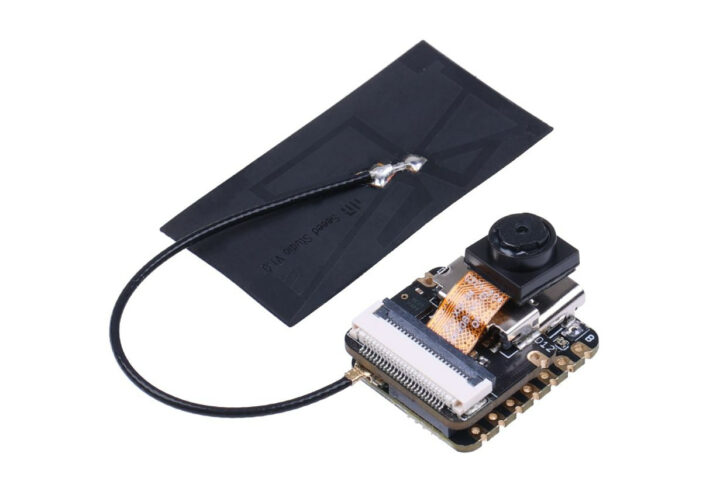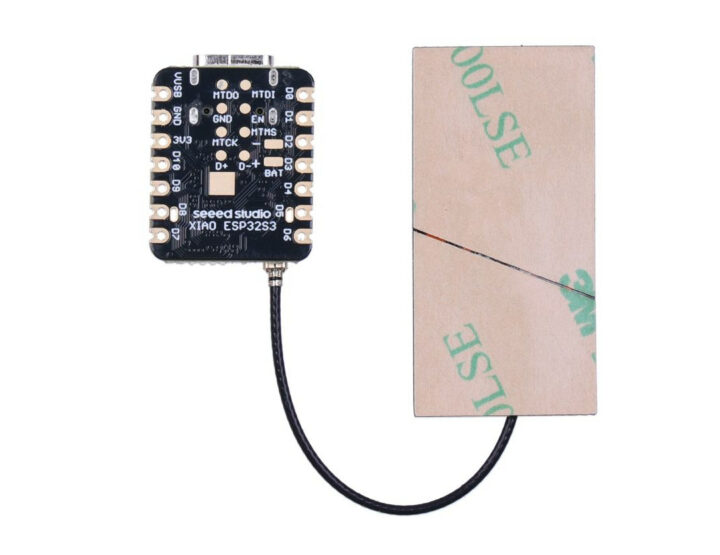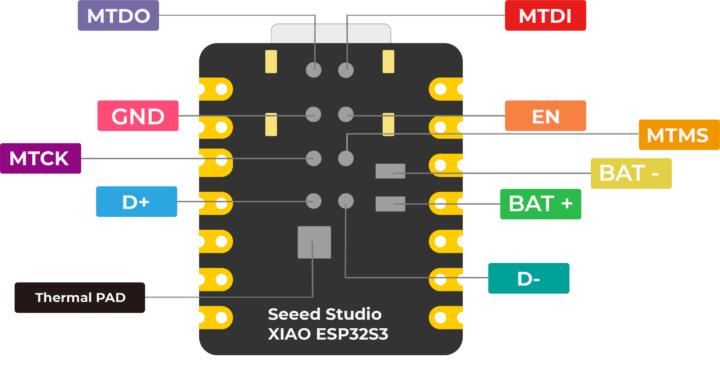Last week, we wrote about the new XIAO ESP32S3, a tiny ESP32-S3 board from Seeed Studio. The company has now launched the XIAO ESP32S3 Sense adding a camera and microphone module connected through a board-to-board connector, as well as the Round Display for XIAO that can help people easily create wearable devices with a touchscreen based on any board from the XIAO family.
XIAO ESP32S3 Sense
XIAO ESP32S2 Sense specifications:
- Wireless MCU – Espressif Systems ESP32-S3R8 dual-core Tensilica LX7 microcontroller @ 240 MHz with 512KB SRAM, 8MB PSRAM, Wi-Fi 4 & Bluetooth 5.0 dual-mode (Classic + BLE) connectivity
- Storage – 8MB SPI flash, microSD card slot
- Antenna – External u.FL antenna
- USB – USB Type-C port for power and programming
- Camera – OV2640 camera sensor up to 1600×1200 resolution
- Audio – Built-in digital microphone
- Expansion I/Os
- 2x 7-pin headers with 1x UART, 1x I2C, 1x SPI, 11x GPIO (PWM), 9x ADC, 2x additional GPIOs on camera/microphone module
- 3.3V I/O voltage (not 5V tolerant)
- Debugging – JTAG pads
- Misc – Reset button, Boot button, 1x User LED, charging LED
- Power Supply
- 5V via USB Type-C port
- Support for LiPo batteries up to 4.2V with battery charging chip, charging current: 100mA
- Power consumption @ 5V
- WiFi – 110 mA in active mode
- BLE – 102 mA in active mode
- Web camera – Average: 138mA; photo shot: 341mA
- Microphone recording to SD – Average: 46.5mA; peak: 89.6mA
- Dimensions – 21 x 17.5 x 15mm
- Temperature Range – -40°C to 65°C
The XIAO ESP32S3 Sense also adds a microSD card slot to record images or audio, the charging current is double the one of the XIAO ESP32S3, it’s thicker and consumes more power even if the camera and microphone are not used.
Seeed Studio provides more technical details and instructions to get started with the Arduino 2.0 IDE on the wiki. It just explains how to blink an LED for now, and there aren’t any samples or instructions for the camera, microphone, or ESP32-S3 machine learning capabilities that I could find, but I’m sure it will come later.
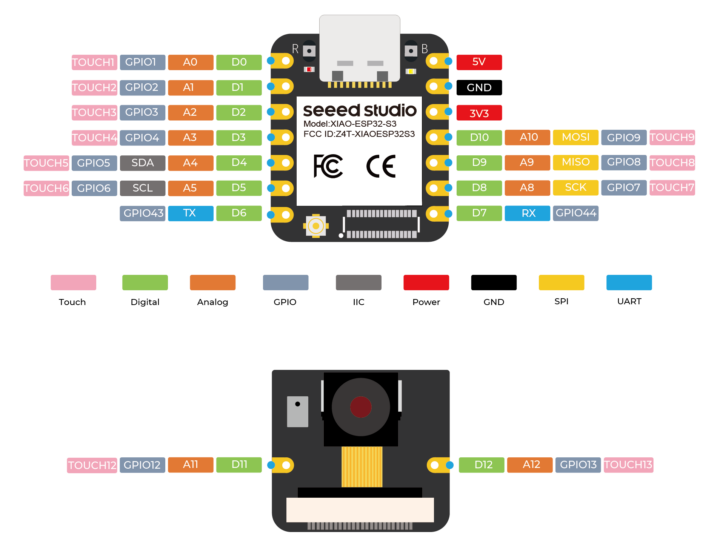
The XIAO ESP32S3 Sense with a built-in camera and microphone can be pre-ordered for $13.99 plus shipping with deliveries scheduled to start on April 12. For reference, the original XIAO ESP32S3 board is sold for $7.49 plus shipping, so the Sense module adds about $6.5.
Round Display for XIAO
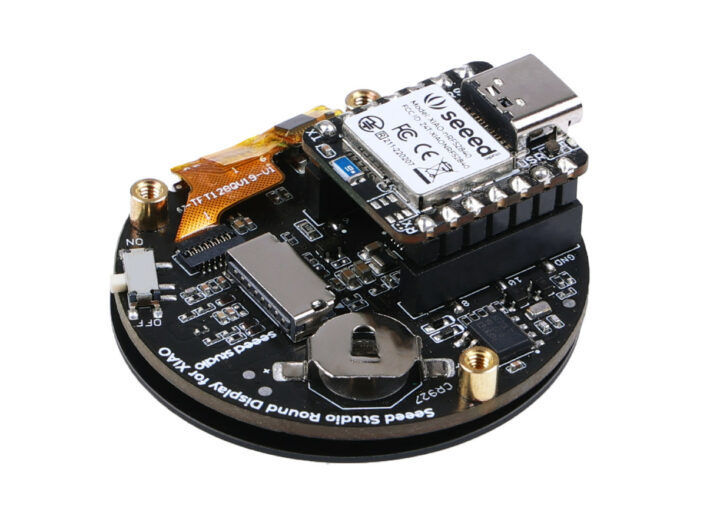 You can now create your own smartwatch, albeit rather thick, by combining the Round Display for XIAO with one of the XIAO boards based on nRF52840, RP2040, SAMD21, or ESP32 microcontrollers. All you need to do is to solder male headers to the XIAO board before inserting it into the female headers of the Round Display for XIAO.
You can now create your own smartwatch, albeit rather thick, by combining the Round Display for XIAO with one of the XIAO boards based on nRF52840, RP2040, SAMD21, or ESP32 microcontrollers. All you need to do is to solder male headers to the XIAO board before inserting it into the female headers of the Round Display for XIAO.
Round Display for XIAO specifications:
- Display – 1.28-inch touchscreen display with 240×240 resolution, 65K colors, 100 Hz refresh rate
- Storage – microSD card socket
- Misc – Power switch, PCF8563 RTC chip with CR927 backup battery
- Power Supply
- 5V via headers (and USB-C port from XIAO); consumption: 35mA
- 3.7V Li-ion battery via JST 1.25mm pitch connector; consumption: 37mA; charging current up to 485mA
- Dimensions – 39 mm Φ
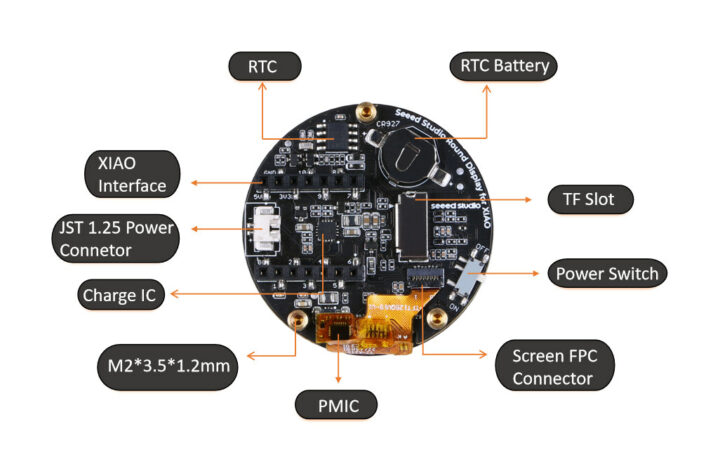 I can see two potential conflicts when the display is connected to the XIAO board. The first is that both boards support Li-Ion batteries with charging, and it’s unclear how it is handled. The second is that the XIAO ESP32S3 Sense also comes with a microSD card slot, so we have two microSD card slots in that case. Seeed Studio has an answer for that one:
I can see two potential conflicts when the display is connected to the XIAO board. The first is that both boards support Li-Ion batteries with charging, and it’s unclear how it is handled. The second is that the XIAO ESP32S3 Sense also comes with a microSD card slot, so we have two microSD card slots in that case. Seeed Studio has an answer for that one:
If you connect XIAO ESP32S3 Sense with this extension screen, the data transmission of the TF card will be applied in the Seeed Studio XIAO ESP32S3 Sense. Meanwhile, the TF card on the screen will not be used.
The wiki for the display explains how to get started with the Arduino IDE with the exact instructions depending on the specific XIAO board selected for the project, but in all cases, it is relying on the TFT_eSPI library with support for the Round Display expected to be merged in the next release. Seeed Studio also provides a getting started guide for the LVGL graphics library that can help design pretty cool interfaces and is even used in commercial products such as the Xiaomi S1 Pro smartwatch.
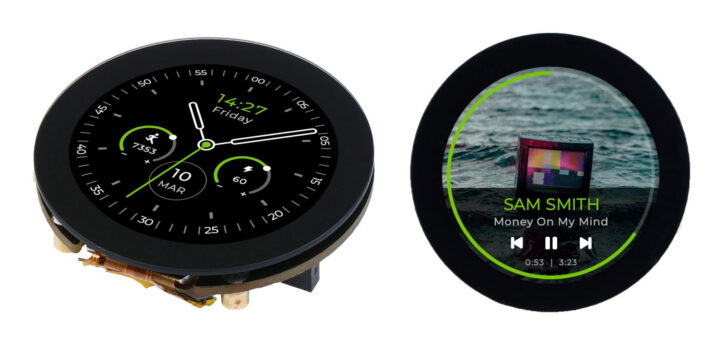
Seeed Studio is taking pre-orders for the XIAO Round Display for $18 plus shipping and availability is scheduled for April 3.

Jean-Luc started CNX Software in 2010 as a part-time endeavor, before quitting his job as a software engineering manager, and starting to write daily news, and reviews full time later in 2011.
Support CNX Software! Donate via cryptocurrencies, become a Patron on Patreon, or purchase goods on Amazon or Aliexpress


